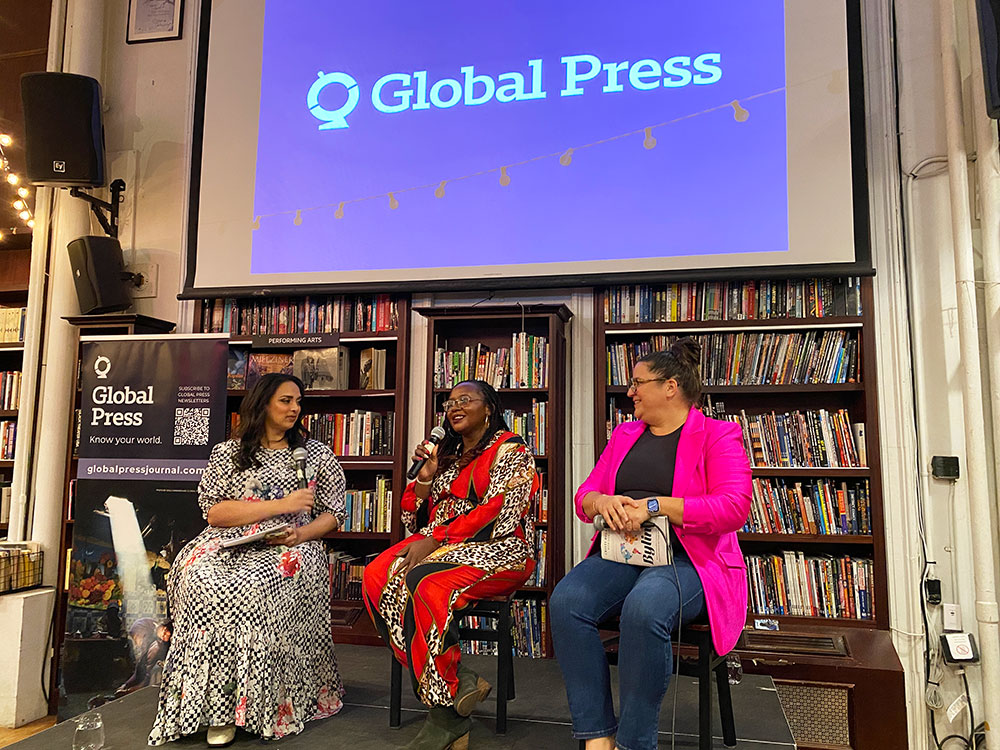
Cristi Hegranes believes in local reporting. That’s why nearly two decades ago, she founded Global Press, an organization dedicated to covering news around the world. Her formula is simple: hire local people to write about local issues. She outlines the success of her new model of journalism in the book Byline.
Teen Vogue Editor-in-Chief Versha Sharma joined Hegranes and Global Press reporter, Zimbabwean journalist Kudzai Mazvarirwofa, at Housing Works Bookstore in Lower Manhattan to discuss journalism, the book, and why local reporters and reporting matters. The event was sponsored by Foundation CHANEL.
Global Press consists of local women journalists reporting on issues familiar to them. The reporters decide the stories that matter to them and their community rather than relying on editors from afar dictating the narratives that matter. The result is a very different kind of international news story from the what is traditionally offered by multinational conglomerates.
Too often, news outlets, especially in the United States, will deploy journalists in other countries with little on-the-ground knowledge, few connections, and a lack of understanding of the local culture. Hegranes calls these “parachute journalists,” because they fly in and fly out without really understanding what they are reporting on. The problem has been made worse as fewer outlets maintain foreign bureaus, instead sending reporters with little experience in the region they suddenly are expected to be experts in. By hiring local reporters to cover local issues, Hegranes’s organization, Global Press, has a staff of people deeply familiar with the places they are covering.
The concept is something Hegranes knows first hand when she earned herself a coveted assignment while still in journalism school. She was sent to abroad to cover a story she had pitched, and a week or so into the assignment she realized she was entirely the wrong person the write about the story. She was out of place, and more importantly out of context.
What evolved was Global Press. The organization was founded in 2006 and now has reporters around the world at established, independent new bureaus staffed by women journalists. The locations are typically in regions least covered by international press. Since its founding, more than 250 journalists have been trained by the Global Press organization.
The event at Housing Works kicked off with Hegranes showing a video explaining the concept of the organization. The key to the success is that instead of foreign editors assigning stories to reporters, they pitch their own stories. These issues are meaningful to them and their communities rather than driven by the perceived tastes and pre preconceived expectations of a foreign audience. The local reporters research and produce the story, and then from there it is published both locally in local languages and in English on an international platform.

And the journalism matters.
One example Hegranes brings up was their reporting on virginity testing. A local journalist in Mongolia wanted to cover the story of how young girls were plucked from their high school classrooms and inspected for virginity, often by a male technician. The examinations were forced, as reported in the Global Press Journal.
As a result of coverage by Global Press, the story picked up international notoriety, and pressure from those news items led the government to end the practice. Today, the Global Press reporters regularly check in to see whether the ban has been upheld.
Hegranes also read from the book, Byline. The first draft was written in four months, she says, because of how important the narrative was to her. She also wrote it too while mothering a toddler — no small feat, let me tell you.
After reading a passage, Global Press correspondent Kudzai Mazvarirwofa joined her on stage. Mazvarirwofa is a Zimbabwean journalist who talks about the process of Global Press, and how the organization helped her and other reporters prepare for the onset of the global pandemic. With journalists stationed around the world, they were watching as the pandemic shutdowns rolled across the globe.
As lockdowns approached in Zimbabwe, Mazvarirwofa explains how Global Press prepped their journalists ensuring they had access to the tools they needed to keep reporting, as well as incoming pay.
A global organization has some unique challenges. One of those, Hegranes explained, is how Global Press has a style guide appropriate for an international news organization. Jargon terms like “global south” are out. What does that mean, after all? Most people will struggle to define it, even in English. The important thing to Global Press is to use words with clear meaning and relevancy rather than through the lens of the west.
Hegranes is a true believer. She not only wrote Byline, but she simultaneously runs the Global Press organization. Byline is available now.